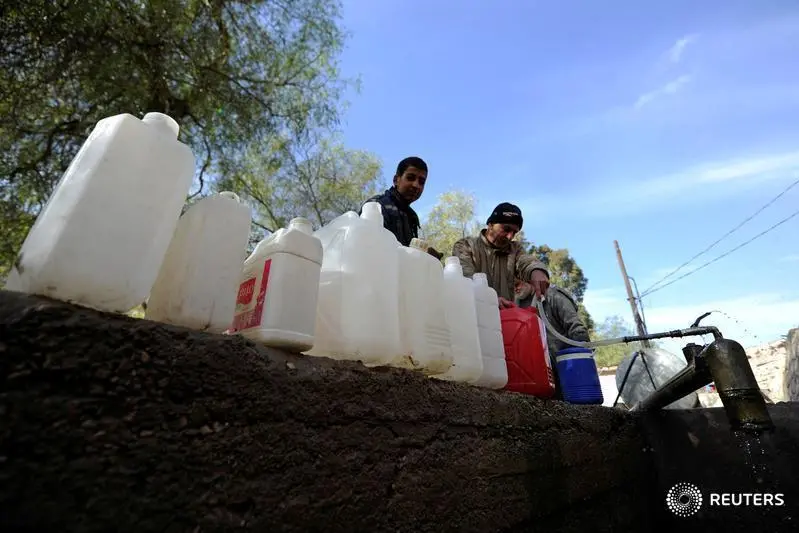PHOTO
Tuesday, Jan 10, 2017
Beirut: Plain clothed agents of Syria’s mukhabarat, or intelligence service, are roaming the streets of Damascus.
They are clearly on the lookout, hunting neither for dissidents nor terrorists, but rather water vendors, a new creed of ‘criminal’ that has overrun the country’s capital.
This is a relatively new profession in Damascus, born amid the gripping water crisis that started on December 22, 2016 after the pipelines of Ain Al Fijeh were destroyed during fighting between rebels and government forces.
Accusations have traded back and forth over who is responsible for the pipeline damage to Damascus’ main water source in Wadi Barada, just 18km northwest of the capital.
Around 1,500 rebels in Wadi Barada are under attack by government forces, despite a nationwide ceasefire brokered by Russia and Turkey on December 30.
Since 2012, rebels have been in full-control of the capital’s water reservoir, but there have been no major disruptions in the water flow until recently.
Damascus residents, who have been relatively sheltered from the horrors of the six-year civil war in the country, have been without water now for two weeks.
With water now becoming a scarce commodity, the water business has turned into a mafia-like enterprise with dealers selling it at black market prices.
Water is extracted mainly from wells around the city, or stolen or bought illegally from government tanks, and then re-sold at inflated prices.
Damascus authorities are now scrambling to crackdown on the dealers.
“We have clear orders to arrest anyone selling water illegally,” Mohammad Bawarshi, of the Damascus Municipality told Gulf News.
But it has proved to be a difficult task.
“Residents are seemingly protecting their water vendors and are refusing to give up their names because they are providing a critical resource that the government cannot give them, at least for now,” he said.
The cell phone numbers of the popular water vendors are distributed by encrypted WhatsApp messages or through Facebook, and they have divided the city into zones of distribution, catering to each neighbourhood independently, often at night when government officials are off-duty.
Gulf News telephoned one of them, a man called “Abu Bilal,” asking to buy ten barrels of water at any price.
“I have a queue of fourteen customers waiting today, and cannot come before Thursday evening,” he said.
When asked if the price was fixed, he replied: “nothing is fixed. Water is like the bourse nowadays — each day has its own price”.
Water vendors are currently charging 2,500 Syrian pound (Dh18.35 or $5) for one barrel of fresh water, said Abu Bilal, an astronomical sum given that an average Damascus family consumes anywhere between 100-150 barrels per month, at a price of $500-750.
In a city where millions are employed by the public sector for a monthly salary of approximately $100-150, very few can afford the black market prices.
Before the crisis started in late December, the price of five barrels of fresh water or one tank, stood at merely 500 pounds ($1) meaning the price of barrels has increased by 2,500% in just three weeks.
Those who cannot buy water are forced to live on the water rationed to them by the Syrian government, which has been distributed in charts also via Facebook.
Some neighbourhoods getting the water in the morning and others at night.
Many residents say the water rations are not enough and are unreliable.
“They told us we would get water at 10pm but we didn’t until 3am,” said Alice, a lawyer in the Christian Bab Touma neighbourhood.
“The charts are a big lie.”
Government water comes for two to three hours only, which is barely enough to fill the tanks of an average household for no more than a day or two.
Jumaa, a resident of Souq Saruja, an ancient neighbourhood outside the walls of Old Damascus, told Gulf News, “Flushing the toilet consumes water — so does washing the dishes, turning on the washing machine, and cleaning the house — not to mention drinking. We cannot afford to buy bottled water from the market and still rely on tap water to drink.”
Bottled water, known as Boukein in Syria, used to sell at 700 pounds ($1.4) for a pack of six. It now costs 1,400 pounds ($2.6) because of the city’s water crisis.
Social media activists are poking fun at their own misery, paying homage to photos of gushing fountains and running tap water, and promoting a campaign that says: “It’s my right to bathe!”
Meanwhile, those living in Damascus’ upscale neighbourhoods are barely feeling the brunt due to the giant water tanks installed in their basements.
By Sami Moubayed Correspondent
Gulf News 2017. All rights reserved.





















